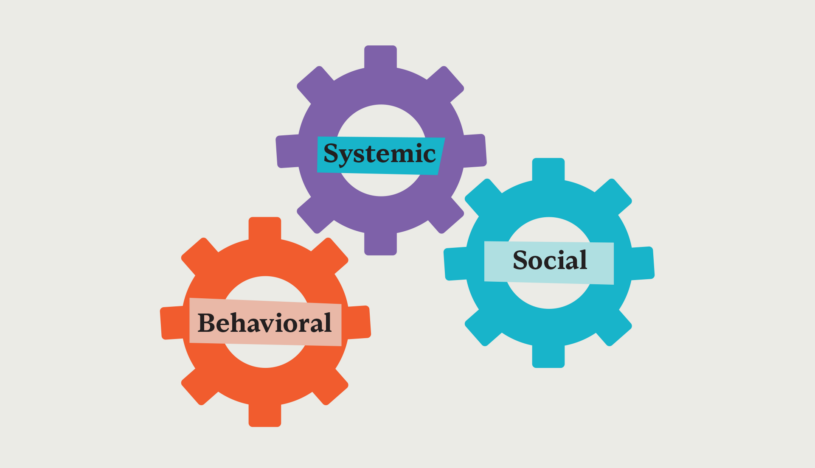New Study: Treating PSB Matters
Discover how treating problematic sexual behavior (PSB) can help end the cycle of child sexual abuse.

Treating children who act out sexually may be critical to breaking persistent cycles of sexual abuse in our society. Clinicians and researchers are moving away from labeling these children as sexual offenders and focusing instead on identifying and treating problematic sexual behavior (PSB).
Child sexual abuse is a serious, persistent public health issue. What may be surprising is that many instances of child sexual abuse are committed by another child or youth under 18. Facing this truth has led experts to new conclusions about ways to end child sexual abuse.
Children are not adults.
Although child sexual abuse is commonly thought of as an adult-perpetrated crime, recent research indicates that youth are responsible for at least one-third and possibly as many as 70% of sexual offenses committed against children.[1]
Historically, children who harm other children sexually were seen by society and by professionals involved in these cases as similar to adult offenders. Strategies for responding to adult offenders, such as prison sentences and sex offender registries, were extended to youth by default.
Child-centered strategies make a difference.
In recent years, however, there has been growing recognition that youth who act out sexually are quite different from adult offenders in their motivations to offend and their responsiveness to treatment.
Experts and practitioners in the field are now acutely aware of the critical importance of intervening effectively to serve better both the child victim and the youth who has displayed problematic sexual behavior, or PSB.
The National Center on Youth Sexual Behavior defines PSB as “deviations from normative or typical sexual behavior. They are child-initiated behaviors involving sexual body parts (i.e., genitals, anus, buttocks, or breasts) and are developmentally inappropriate and/or potentially harmful to themselves or others.”
While victims of youth-perpetrated child sexual abuse require services and responses, those youth who initiate sexual acts also need tailored services and responses. Responding to the initiators can also serve in the healing journey of the victim.
Treating PSB supports victims, too.
Treatment focuses on taking accountability and understanding how and why one’s actions were harmful. This is especially important in sibling sexual abuse cases. If services and support focus on the victim alone, we fail to support the whole family, which ultimately does a disservice to the victim.
CACTX is committed to supporting local children’s advocacy centers (CACs), their multidisciplinary teams (MDTs), and communities throughout Texas in the identification and treatment of children who are displaying problematic sexual behavior.
Intervening effectively in cases involving children with PSB is not only critical to support healing for victims and their families but also presents enormous opportunities to minimize the likelihood a child with PSB will harm again in the future.
Evidence-based impacts.
Contrary to the myth that once a sex offender always a sex offender, youth with PSB who receive appropriate treatment rarely go on to offend again in adulthood.
Research shows that youth who offend sexually are characteristically very different from adults who offend sexually. Neuroscience has revealed that youth and adults differ in their cognitive and emotional capacities and skills, and in their ability to self-manage and self-regulate.[2]
As compared to adults, youth have more trouble controlling impulses, resisting peer pressure, and understanding consequences.[3] But, due to youthful brain malleability, children are more easily taught new and appropriate behaviors.
Research has shown that children displaying PSB are extremely responsive to treatment and unlikely to reengage in that behavior post-treatment. A follow-up study showed that only 2% of children who received therapy specific to PSB engaged in PSB again within ten years after completing treatment.[4]
Many myths and misconceptions surround this topic, and many professionals do not understand this population of children and the dynamics of these cases.
Applying new wisdom in Texas.
Despite the increase in attention PSB cases have received in recent years, the fact remains that until recently, little was known about how PSB cases were being handled across Texas. We set out to assess how MDT professionals are balancing newer, treatment or rehabilitation-oriented recommendations vs. older punishment-centered ones in Texas.
CACTX worked with Dr. Caitlyn Muniz with The University of Texas at El Paso to find out. CACTX worked to select six representative CACs to participate, with jurisdictions ranging from small or rural to mid- and large-sized or urban centers. Between September 2022 and March 2023, the research team conducted a mixed methods study in three parts:[5]
- One-on-one interviews: 7 sessions with CAC staff, most of whom were Clinical Directors.
- Focus groups: 5 groups made up of MDT members plus judges and juvenile probation officers.
- Surveys: 350 MDT responses to a survey based upon our initial qualitative findings.
Actionable insights found.
Our research found that myths and misconceptions surround the role of PSB in child sexual abuse cases, leading to inconsistent case handling. Unfortunately, these misconceptions can fuel case handling that may compound and perpetuate both problematic sexual behavior and child sexual abuse.
Many Texas professionals do not understand PSB or the dynamics of differing approaches to the issue. Our study confirmed that there is a need for more training for professionals making decisions in cases involving children with PSB across the state.
Because there are no clear guidelines on best practices for these cases statewide, there are often different outcomes for different kids depending on the jurisdiction in which they offended.
Equipped with this evidence, CACTX will engage in meaningful action to support MDTs across the state in consistent and positive case handling. Most notably, two priorities for CACTX’s fiscal year 2024 are the development of a PSB Toolkit for CACs and MDTs, and the development of targeted, discipline-specific PSB training.
Developing a PSB Toolkit.
The PSB Toolkit will offer best practice recommendations starting from how these cases are first identified through the point at which the cases reach successful closure.
MDTs can expect to find information on screening, assessment, treatment, appropriate case triage, alternatives to traditional prosecution, and community buy-in.
Eventually, CACTX envisions a Texas in which everyone is operating under the same guidelines in PSB cases, acting in ways that best serve impacted children and families in our state.
Discipline-specific training insights.
While the PSB MDT Study offered confidentiality to all participants, discipline-specific data was also collected. Across disciplines, key similarities were noted. Professionals share the belief that children should not be placed on sex offender registries and that children who initiate sexual acts could benefit from treatment.
This common ground offers opportunities for further training so that each discipline can think more critically, choose more evidence-based best practices, and understand each other across MDT working groups.
For example, mental health professionals and medical professionals are more likely to advocate for treatment, while prosecutors and probation officers are more likely to believe that legal action should be taken. CACTX will examine the strengths of each discipline and determine what training may hold the highest impact in bolstering those strengths.
Building an abuse-free future.
As we work toward consistency across our state, and as we engage in efforts to train MDTs on best practices for handling these cases, CACTX hopes to support local communities in the most effective and holistic way possible.
Growing our insights on the truths surrounding child sexual abuse and the potential to break abuse cycles by effectively treating PSB is critical to ending child sexual abuse in Texas. As our knowledge of effective strategies grows, we will detect PSB cases earlier and respond with effective PSB treatment.
We will do this because a treatment-based approach mitigates more potential harm for child victims and child perpetrators — and makes possible a future in which we will prevent problematic sexual behavior from ever occurring in the first place.
[1] Finkelhor et al., 2009; Finkelhor et al., 2015; Gewirtz-Meydan, 2020; Hackett, 2014; Shawler et al., 2020
[2] Tolan et al., 2012
[3] Tolan et al., 2012
[4] Carpentier et al., 2006.
[5] Muniz, C.N., Villalobos, M., Clark, D.A., & Hartman, R. (2023). Examining the Handling of Cases Involving Children with Problematic Sexual Behavior. Austin, TX: Children’s Advocacy Centers of Texas.




